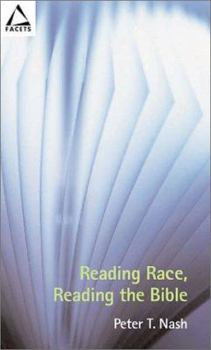Reading Race Reading Bible
Nash explores the role of race in the interpretation of the Bible and its pertinence to today's black church. Nash not only traces the modern developments and the misinterpretation of Scriptures, he... This description may be from another edition of this product.
Format:Paperback
Language:English
ISBN:0800636333
ISBN13:9780800636333
Release Date:September 2003
Publisher:Fortress Press
Length:72 Pages
Weight:0.22 lbs.
Dimensions:0.2" x 4.3" x 7.0"
Customer Reviews
1 rating
Race implies Religous Doctrine?? Let's Talk!!
Published by Thriftbooks.com User , 20 years ago
Excellent Scholarship! Accessibly written, Peter Nash's "Reading Race, Reading the Bible" is -- at least -- a much needed service to the 'community of scholars' it targets. Effectively "mining" archived research resources on five continents that were uniquely accessible to him while on location where they were housed (i.e., in Europe, North America, South America, South Asia, and Africa), Dr. Nash's treatment -- at minimum -- brings a relatively comprehensive and rigorous treatment of the subject. His engaging treatment is one done in a way that spans anthropological, theological, historical and sociological disciplines. More to the point, Nash's treatment of what is essentially a doggedly avoided topic of "race and religion" places the onus for failing to seriously engage in a scholarly dialogue of the subject where it squarely resides. That onus rests on the pervasive practice of western society to avoid - and perhaps maintain a prejudicial bias against -- the thoroughly justifiable embrace of the non-western roots of Christianity - itself THE primary monotheistic religious practiced in contemporary pan-European nations. As Nash advances it, it is this routine practice adopted as "the received view" -- derived from a flawed assumption of the "racial/cultural" genesis of contemporary western Christianity -- that is the key source of the difficulties discussed. By implication, Nash argues that it is this apparently pervasive uninformed practice which leads to a flawed interpretation of what constitutes "suitable" and "orthodox" Christian theology. This fundamental error holds even more profound implications with regard to the need to theoretically as well as culturally revamp, and, to develop a deeper understanding of what are essentially falsely perceived limits of what appropriately should be the "officially sanctioned" prerequisites of "orthodox" spiritual practices and theological interpretation as it is ascribed.Cogent as his well-edited -- and compact -- treatise must be (after all, the text is, sans endnotes, less than 80 pgs. in length), the work holds the promise of it very effectively linking the interfaces of the relevant multiple scholarly "communities of practice" impacted. That is also a major aspect of its appeal. These contemporary lines of inquiry are artificially imposed barriers. Barriers that when beached, provide new and a promisingly rich set of novel lines of further inquiry: suggesting exciting -- and fruitful -- future scholarship. Perhaps of equal value for the reader is the manner in which Nash provides a treatment of the key themes. These themes -- as well as reference materials available -- when applied to scholarship, effectively build and support a bridge between the kind of robust, contemporary pedestrian church-held tenants -- such as those routinely exercised in the present day African American church in it's most rudimentary evangelical forms; and, the widely accepted theological frameworks -- such





